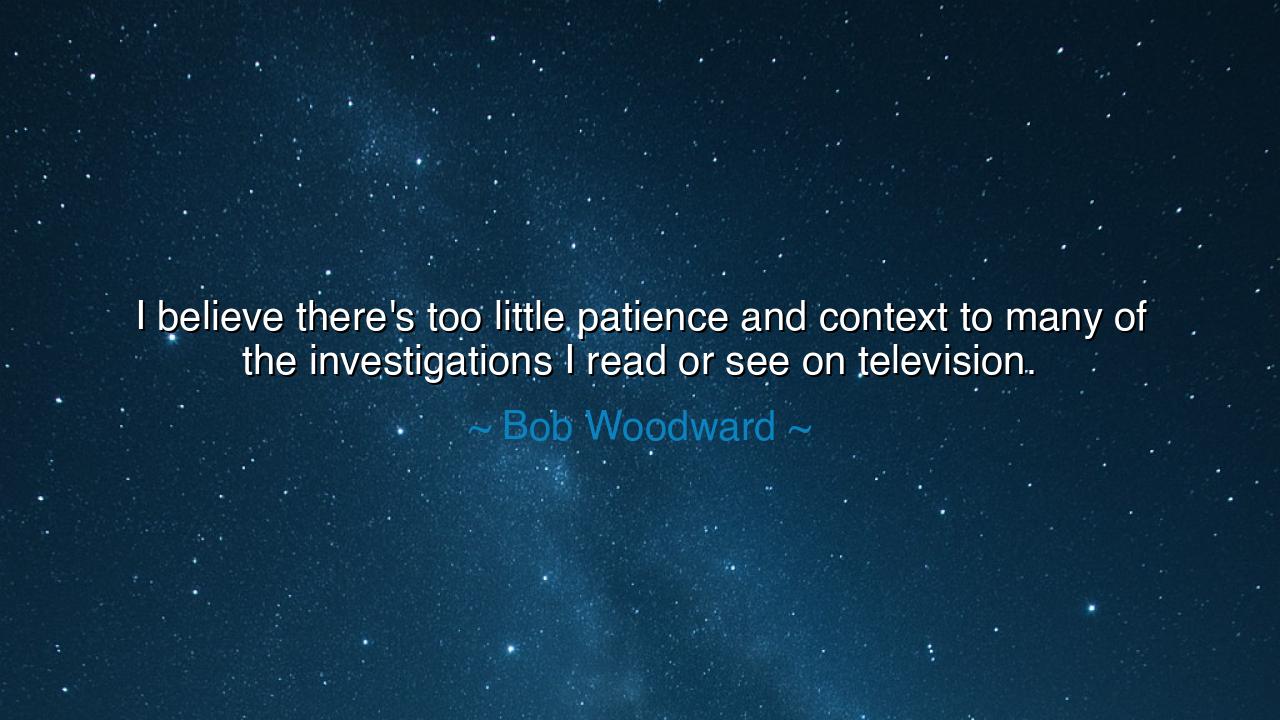
I believe there's too little patience and context to many of the
I believe there's too little patience and context to many of the investigations I read or see on television.






Hear, O listeners, the voice of Bob Woodward, chronicler of hidden truths, who declared: “I believe there's too little patience and context to many of the investigations I read or see on television.” In this utterance is found a lament for our age, in which the thirst for speed drowns the pursuit of depth, and the hunger for spectacle eclipses the search for understanding. Woodward, who once revealed the dark waters of power in the halls of Washington, warns us that without patience and context, investigation becomes shallow, and truth, instead of shining, is distorted.
For investigation is not a quick flame but a long fire that must be tended. It requires patience, the willingness to sift through shadows, to wait for voices to speak, to assemble fragments until the whole picture is revealed. It requires context, the weaving of events into their wider meaning, for without the past and the surrounding world, each fact is but a leaf detached from its tree. When these two virtues are lacking, stories lose their weight, and what remains is noise—momentary, distracting, but empty of lasting value.
Consider, O listener, the tale of Watergate, in which Woodward himself, with Carl Bernstein, pursued the threads of corruption that led to the downfall of a president. That investigation did not unfold in a single night; it stretched across years, through secrecy, denial, and danger. Had they been impatient, the truth would have remained hidden. Had they lacked context, the fragments of scandal would have seemed trivial. But through persistence and perspective, they uncovered a story that reshaped history. Thus, Woodward speaks from experience: without patience and context, even the most urgent truths remain unseen.
Contrast this with the fleeting investigations of our own time—rushed reports, shouted headlines, judgments formed before the dust has settled. These are born of haste, crafted to stir emotions, but they leave no foundation for wisdom. They resemble the builders of the Tower of Babel, who sought to reach the heavens in reckless speed, but whose work collapsed into confusion. Without the patience of steady hands and the context of careful design, the tower of truth cannot stand.
There is also in his words a call for humility. For truth is not simple, and life does not yield its secrets easily. To seek truth requires reverence for complexity, the recognition that no single fact explains the whole. Just as a physician studies not only the wound but the body around it, so must the investigator look not only at the event but the web of causes, histories, and consequences in which it lives. Without this, truth becomes caricature, and wisdom turns to folly.
What lesson, then, shall we inherit from this teaching? That in our own search for knowledge—whether in politics, in personal relationships, or in daily life—we must practice patience and seek context. Do not leap to judgment on rumor or half-seen fact. Do not mistake speed for insight. Learn to pause, to listen, to see how each piece belongs to the larger whole. For only then can truth be discerned, and justice served.
Therefore, O seeker, take these words to heart. Be patient in your inquiries; refuse the temptation of easy answers. Seek context in all matters, knowing that every story belongs to a greater story. And when others are swept away by haste and noise, stand firm, like Woodward in his pursuit, choosing depth over speed, clarity over spectacle. For it is by patience and context that truth endures, while all else passes like smoke in the wind.






AAdministratorAdministrator
Welcome, honored guests. Please leave a comment, we will respond soon